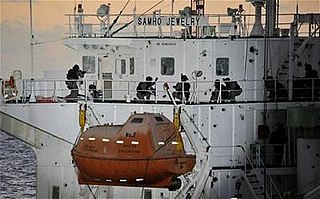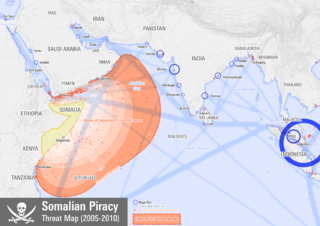Related Research Articles

USS Farragut (DDG-99) is an Arleigh Burke-class destroyer in the United States Navy. She is the fifth Navy ship named for Admiral David Farragut (1801–1870), and the 49th ship of the Arleigh Burke class.

INS Tabar (F44) is the third of the Talwar-class frigate of the Indian Navy. The frigate was commissioned on 19 April 2004 in Kaliningrad, Russia with Captain Biswajit Dasgupta. The current Commanding Officer (CO) of INS Tabar is Captain Mahesh Mangipudi.

HDMS Absalon (F341) and her sister ship Esbern Snare are the two members of the Absalon class. The lead ship of the class is named after Danish archbishop and statesman Absalon and received full operational status in 2007.

Operation Enduring Freedom – Horn of Africa (OEF-HOA) is a component of Operation Enduring Freedom (OEF). The Combined Joint Task Force – Horn of Africa (CJTF-HOA) is the primary military component assigned to accomplish the objectives of the mission. The naval components are the multinational Combined Task Force 150 (CTF-150) and Combined Task Force 151 (CTF-151) which operates under the direction of the United States Fifth Fleet. Both of these organizations have been historically part of United States Central Command. In February 2007, United States President George W. Bush announced the establishment of the United States Africa Command which took over all of the area of operations of CJTF-HOA in October 2008.
Piracy off the coast of Somalia occurs in the Gulf of Aden, Guardafui Channel, and Somali Sea, in Somali territorial waters and other surrounding places and has a long troubled history with different perspectives from different communities. It was initially a threat to international fishing vessels during the early 2000s, only to rapidly escalate and expand to international shipping during the War in Somalia (2006–2009).

The action of 11 November 2008 was a naval engagement fought off Somalia between pirates and British forces. Russia has stated that its forces fought off the pirates also, though Russia's involvement has been disputed by the Royal Navy. The incident took place 60 nautical miles (110 km) south of the Yemeni coast, in the Gulf of Aden. When the Royal Navy ship HMS Cumberland, "attached to the NATO task force in the region" attempted to board a Somali pirate dhow with twelve pirates on board, the pirates initially resisted with assault rifle fire. After a brief shoot-out with the Royal Marines, two pirates were killed and the dhow was captured by Cumberland. The Times has described the incident as "the first time the Royal Navy had been engaged in a fatal shoot-out on the high seas in living memory." The Independent has also stated that the confrontation "is believed to be the first time recently that British naval service personnel have been involved in a confrontation that resulted in deaths", and The Toronto Star has stated that the engagement is "the first time since the 1982 Falklands War that the Royal Navy had killed anyone on the high seas."
The MV Powerful is a Danish-flagged cargo ship owned by Excel Maritime Carriers Ltd. of Greece. It was attacked with the intention of hijack by Somali pirates using assault rifles on November 11, 2008 in the Gulf of Aden off the Horn of Africa. Its capture was thwarted by the Royal Marines of the British frigate, HMS Cumberland, as well as the crew of a Russian Neustrashimy-class frigate.
The MV Biscaglia was a chemical tanker managed by Ishima Pte. Ltd. of Singapore and held by Industrial Shipping Enterprises Management Company LLC of Stamford, Connecticut, USA.

Combined Task Force 151 (CTF-151) is a multinational naval task force, set up in 2009 as a response to piracy attacks in the Gulf of Aden and off the eastern coast of Somalia. Its mission is to disrupt piracy and armed robbery at sea and to engage with regional and other partners to build capacity and improve relevant capabilities in order to protect global maritime commerce and secure freedom of navigation. It operates in conjunction with the EU's Operation Atalanta and NATO's Operation Ocean Shield.

Operation Dawn of Gulf of Aden was a naval operation by the Republic of Korea Navy against Somali pirates in the Arabian Sea. The operation was spurred by the pirates' seizure of the South Korean chemical tanker Samho Jewelry. In response, the South Korean government sent a destroyer and 30 naval commandos to retake the ship and rescue its crew. After trailing the tanker for several days and fighting a preliminary engagement that neutralized four of the pirates, the South Korean forces retook the ship by force on January 21, 2011, in a successful boarding action that resulted in the deaths of eight and the capture of five out of thirteen pirates.

Piracy in the 21st century has taken place in a number of waters around the world, including the Gulf of Guinea, Strait of Malacca, Sulu and Celebes Seas, Indian Ocean, and Falcon Lake.

Operation Ocean Shield was NATO's contribution to Operation Enduring Freedom – Horn of Africa (OEF-HOA), an anti-piracy initiative in the Indian Ocean, Guardafui Channel, Gulf of Aden and Arabian Sea. It follows the earlier Operation Allied Protector. Naval operations began on 17 August 2009 after being approved by the North Atlantic Council, the program was terminated on 15 December 2016 by NATO. Operation Ocean Shield focused on protecting the ships of Operation Allied Provider, which transported relief supplies as part of the World Food Programme's mission in the region. The initiative also helped strengthen the navies and coast guards of regional states to assist in countering pirate attacks. Additionally, China, Japan and South Korea sent warships to participate in these activities.
The following lists events that happened in 2009 in Somalia.

Piracy in Somalia has been a threat to international shipping since the beginning of the country's civil war in the early 1990s. Since 2005, many international organizations have expressed concern over the rise in acts of piracy. Piracy impeded the delivery of shipments and increased shipping expenses, costing an estimated $6.6 to $6.9 billion a year in global trade in 2011 according to Oceans Beyond Piracy (OBP).
Operation Dawn 8: Gulf of Aden was a naval operation carried out by the Royal Malaysian Navy against pirates in the Indian Ocean on 20 January 2011. In response to the hijacking of MV Bunga Laurel, the Malaysian Shipborne Protection Team deployed an attack helicopter and 14 members of the naval counter-terrorism group PASKAL in two rigid-hulled inflatable boats to retake the vessel and rescue the crew. After one night of trailing the tanker, the Malaysian forces successfully retook the ship by force on 20 January 2011, resulting in the wounding of three and the capture of four out of 18 pirates, and all 23 vessel crewmembers rescued.

MV OS 35 was a bulk carrier registered in Tuvalu, a flag of convenience. It was attacked by pirates near Somalia in 2017, and was beached near Gibraltar after a ship collision in 2022. The ship was disposed of afterwards.

Chinese naval escort in Somalia,Is a military operation launched by the Chinese People's Liberation Army Navy in Gulf of Aden Somali pirates frequent waters since the end of 2008. This action was undertaken by the Central Military Commission of the People's Republic of China in accordance with the United Nationsthe Security Council resolution 1846 and its subsequent resolutions, and in light of the practice of the States concerned, Carried out with the consent of Government of Somalia. The main contents of the operation are: to protect the safety of Chinese ships and personnel sailing in the waters; Protect World Food Programme and other world organization ships carrying humanitarian supplies. The first Chinese naval escort taskforce to Somalia set sail from the Hainan Sanya military port on 26 December 2008, and arrived in the Gulf of Aden, Somalia, on 6 January 2009 to officially begin escort work. By May 2023, 44 escort taskforces had been dispatched, and escort operations are still ongoing.
2023 in piracy was marked by 120 events of maritime piracy against ships, according to the annual Piracy and Armed Robbery Report of the ICC International Maritime Bureau (IMB). 105 vessels were boarded, nine additional attacks attempted, two fired upon, and four vessels hijacked.
2024 in piracy included 33 reports of maritime piracy and armed robbery against ships to the International Maritime Bureau during the first quarter of the year. Incidents included 24 vessels boarded, six of which experienced attempted attacks; two hijacked; and one fired upon. Crew continued to suffer violence, with 35 crew taken hostage, nine kidnapped, and one threatened during three first three months of the year.
References
- ↑ Harrison, Mike (27 August 2009). "Somali Pirates Open Fire on U.S. Navy Helicopter, U.S. Navy Says". Bloomberg. Bloomberg L.P. Retrieved 3 September 2009.
